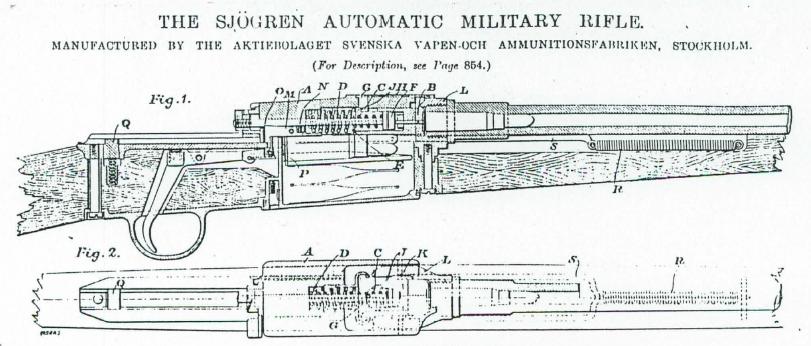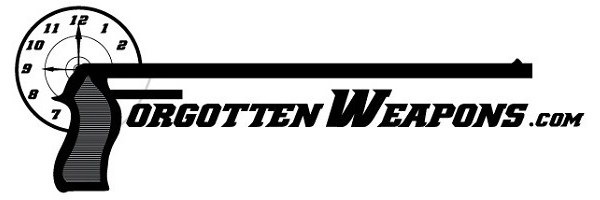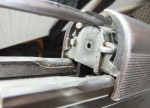The Sjorgen rifle and shotgun designs definitely fit the description of Forgotten Weapons. Developed in Sweden, the Sjogren system used a fixed barrel and recoil-operated action in both a 12 gauge shotgun and .30 caliber military-style rifle. It was claimed to have very light recoil, as a result of the energy absorbed by the action cycling, though this recoil reduction was likely no more significant than today’s autoloading firearms.
Most recoil operated firearms function by having the barrel reciprocate backwards when fired, but the Sjogren system is different. It has a locking block connected to the firing pin, which keeps the bolt assembly locked in place as long as the firing pin is in the forward (fired) position. When a shell is discharged, the recoil energy must first push the firing pin backwards against its spring. This re-cocks the firing pin and also unlocks the barrel. By this time chamber pressure has dropped to a safe level, and the remaining recoil force can push the bolt back to eject the fired case and load a fresh one.

The Sjogren .30 caliber military rifle was submitted to British Army trials, but failed to garner enough interest to see further testing or use (the sample rifle tested currently resides in the British Pattern Room collection). The shotguns saw some commercial sales, and can still be found today from time to time, but were not successful enough to stay in production very long. Not much information is available on the guns, but we do have a copy of an article describing them in some technical detail from a 1908 edition of Engineering magazine.
Articles
(1908) Sjogren system article, Engineering magazine (English)
Photos
Sjogren shotgun in 12ga photos provided by reader David (click here to download the gallery in high resolution):









Was it reliable and easy to use?
This looks like a ridiculously complicated delayed-blowback system. Unlikely to be reliable.
You always get the same feral clowns making the same stupid comments when they don’t own one it’s a shame this idiot couldn’t fire one but then he won’t have the brass to buy one
Not like there are modern shotguns using the same system or anything…
Benelli have been using them for years.
https://www.gmk.co.uk › browse › s…
Web results
Benelli Shotguns – GMK
benneli copied this design it’s a proven fact
Actually, when it was introduced it was regarded as to “modern” and untested (and probably was). At that time most of the military top-brass had made their basic/cadet military training with muzzle-loaders 30 years earlier.
Here is a review and test firing of the Sjorgen shotgun. Does not look very comfy honestly. I don’t think I would like having that bolt carrier slamming back towards my face like that.
http://m.youtube.com/watch?v=XznhQ35AxCQ
Ian himself has fired one in a video and claims they are very pleasant to shoot.
The problem of the exposed delayed blowback operation, very similar to that of most pistols, would be easily remedied by having a thin dust-cover- very likely recommended following military trials as a practical means of keeping the sliding carriage debris free. The Benelli M system is essentially as I described. the receiver acts as cover for the rather scary travelling carriage assembly.
A swedish article about the rifle…
http://www.jaktojagare.se/sjogrens-halvautomat-en-udda-klassiker
This system puts a lot of stress on the firing pin, but with soft primer ammo, it might last longer but with reliability issues.
So exactly like a Benelli! Does the Benelli have reliability issues?
Well, not exactly like a Benelli, if I got it right. In Benelli, a rather massive part of the bolt is actually moving forward (related to the weapon itself) during the shot, not backwards, and unlocks the bolt.
Where can I buy one?
zanimljiv mehanizam – genijalan/elegantna puska [ voleo bih da objavite shematik puske SJOGRIN bio bi Vam zahvalan ] jos bolje ako ste umogucnosti posaljite mi shematic
srdacan pozdrav
Can you access the Sjogren Rifle in your next UK trip? I am wondering just why it garnered no interest. Conceptually it is superbly simple and the shotty works rather well for its time. Compare it to an Auto-5…..
hi simon, are you the same simon tan that I was in discussion with about surplus material in malasia? I would love to chat with you some more. hope all is well .. have a great day. cholly steen from sarco . my email is csteen@sarcoinc.com
The Shutterbug Prime Directive was “always have camera and film;” today’s smart phones with the right apps are so much better. I used to carry a disposable camera “just in case” while working as a security guard–a camera with built-in flash and kept sealed in its retail package. Never needed to break it out, but I got at least one of the security companies I was working for to issue out similar cameras to field supervisors (to be fair, some were issuing 35mm cameras–but the disposable camera was far more cost effective and had an evidence chain utility). The problem with the disposable camera was that I wouldn’t immediately see what I had photographed–the film had to be developed. Another advantage with digital cameras is motion pictures.
Your Sjorgren shotgun adventure upheld the Shutterbug Prime Directive.
Of course, it helps to be in cell phone coverage for immediate posting. Modern cell phones do have limited picture memories–and that helps.
Having your camera with you all the time helps you record “forgotten firearm unicorns” when you unexpectedly run across them–like the firearms exhibits in the Imperial War Museum complex and the British Resistance Museum:
http://www.parhamairfieldmuseum.co.uk/british-resistance-organisation/
Hello. Does anyone know were i can get one of these Sjögren Inertial Shotgun. Any advise is welcome.
Yes I am putting ours up for auction in Australia
Ive got one for sale if your interested
Hello, i have one i want to sell but have no idea what it is worth, what do you value yours at please ? It’s converted to 3 shot I’ve had it for years and it’s never been any trouble.
Dave
So I know this is throwing some very dry spaghetti at a very old wall, but if you see this I would like to talk about that gun and specifically how it was blocked. I’ve noticed a weird number of them with brass or steel rods welded in that ended up in Saskatchewan and Alberta
Ou peut-on acheter des pièces de rechange ?